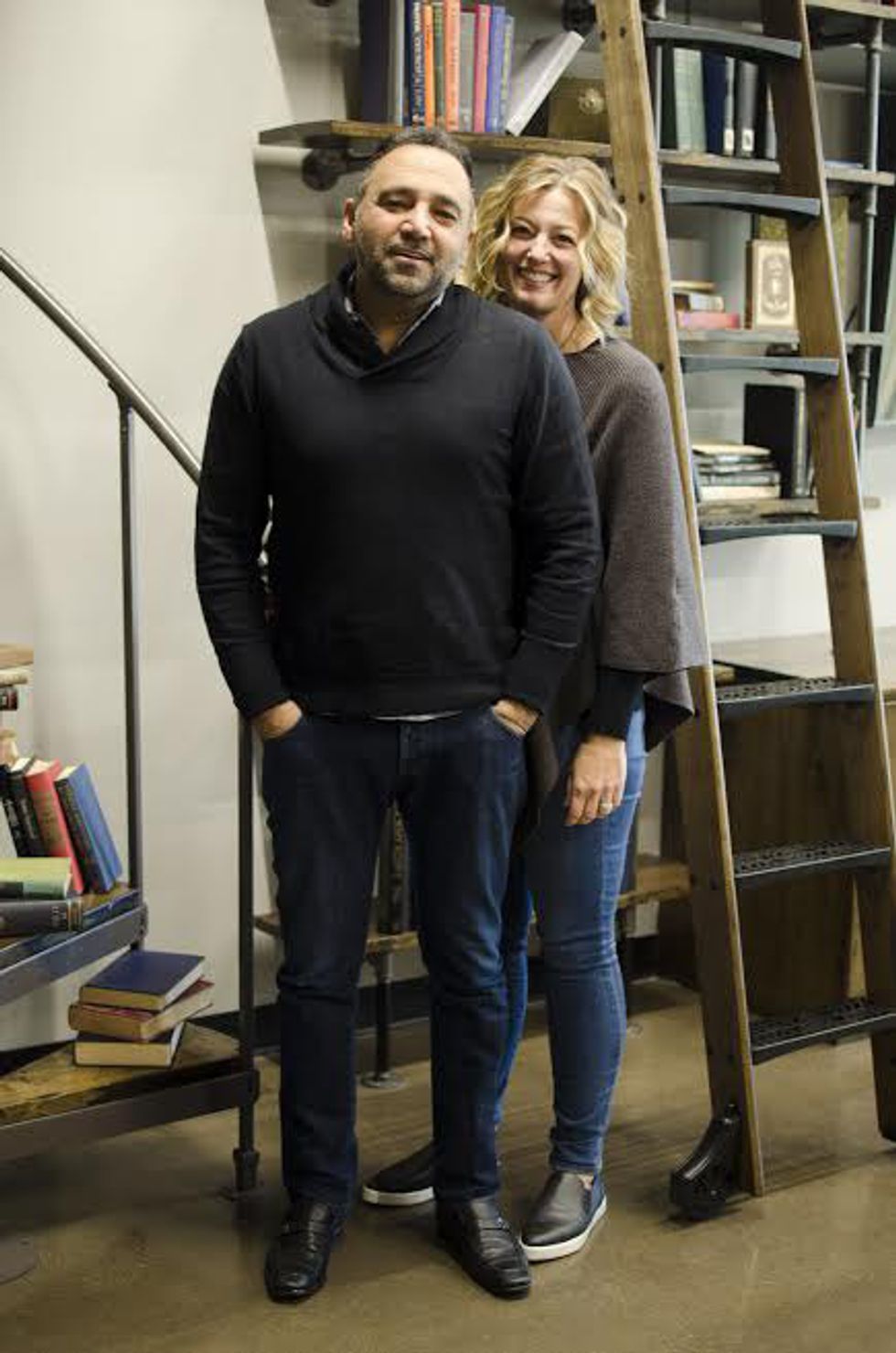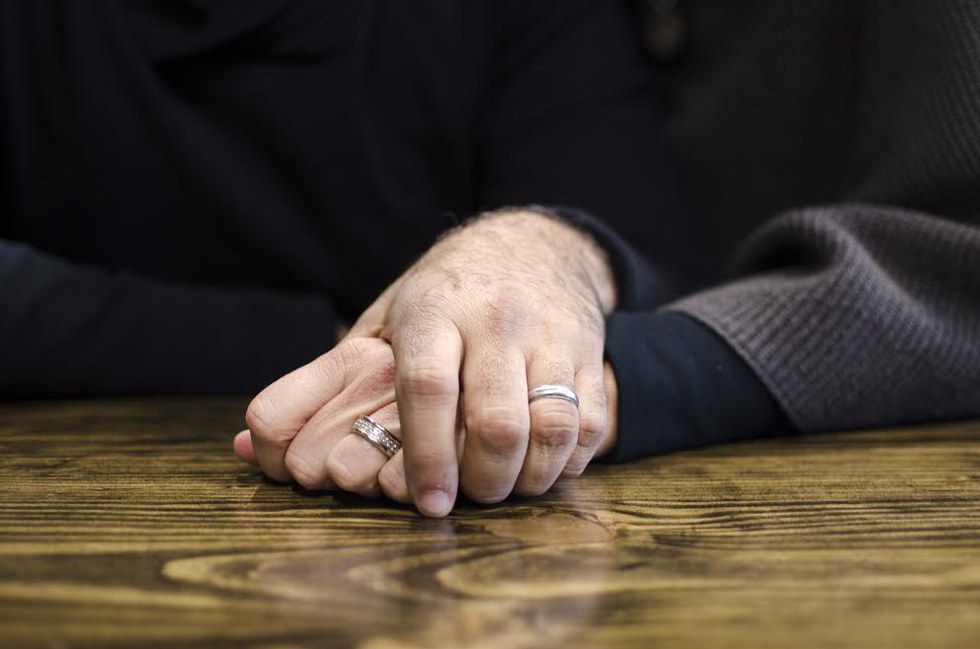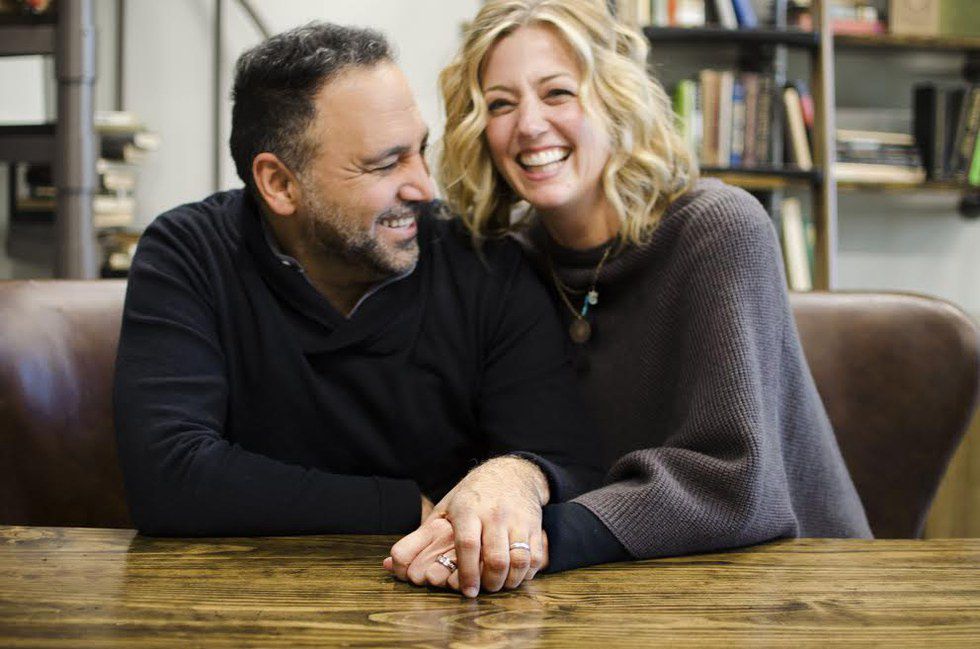Jennifer and David Nasser’s love story cannot fully be put into words- this interview is merely an attempt to answer some of the questions we all wonder about when we think of the words “love story.” Favorite memories, struggling with busy schedules, the effects of children, managing the Biblical concept of submission, and more are subjects which they speak about with extreme honesty and incredible wisdom. They are not perfect and their marriage is not perfect, just as we are all imperfect. However, the window we have been allowed into their relationship does offer a perspective of hope.
-------------------------------------------------------------------------------------------------------------------------------
What is your favorite memory of each other?
D- I’ll go first. I have a lot of moments where I look back and I think, “Wow, I want to make sure I bookmark and remember this moment.” My favorite out of all of them has to be when we finally said the words “I love you” to each other. Jennifer’s grandmother had passed away and we were both at a place where wanted to say “I love you” to the person we would spend the rest of our life with.
I drove several hours of my way to be with you [Jennifer] and I pulled up in the driveway of your grandparent’s house and you came to the stairs and we hugged and you said “I love you” and I said “I love you too.” I just remember that little moment. I had walked up the porch steps, but I was actually two steps down, so she kind of jumped on top of me when she said it. It was such a sweet moment.
J- Just off the top of my head, when we first got married we didn’t have a ton of money and I was teaching school while he was travelling and we had talked about wanting to go to a bed and breakfast and we couldn’t. I came home from school one day and he had taken all of the living room furniture and put it in the bedroom and took all the bedroom furniture and put it in the living room because there was a fireplace in there. And he had started a fire and it was like our own little bed and breakfast. I think you [David] even made a little sign for it. It was one of my favorite memories, but there are thousands of memories, that was just one right off the top of my head.
How has having children affected your relationship, especially since you have both a biological child and an adopted one?
J- Any parent would tell you that there are things that are harder to deal with and things that are better. Children enhance the really good and if there’s something really hard then they enhance that as well. I also think it has made us appreciate each others strengths more. He can relate to our kids in a certain way and I’ll think, “I never would have thought of that.”
D- When we first got married, I was so affirmed by the fact that I get to have this woman as a wife. And when we had kids I still had that, but then I also got to see her be the mother of my children. Your spouse becomes your partner in raising a child and you get to see a different side of that person. Jennifer does an amazing job with our kids.
One of the greatest things we’ve ever done in our life was have Rudy, our son. It’s specifically affected our relationship because we both had things we were called to before we got married. Once we were married, it became my job to help her goals come about, just as it became her goal to help mine. One of her callings was adoption because she saw a play of Oliver Twist in the first grade and God broke her heart for orphans. We both benefit from that, although I never would have adopted Rudy if it hadn’t been for Jennifer.
What advice do you have for other interracial couples who may be worrying about mixing their different backgrounds?
J- You have to walk into your marriage practically with your eyes open. You have to understand that when you marry somebody, you really do marry into their family. So you have to be proactive in understanding where they come from and how you can best walk into that and your new role. You can’t just say, “oh we love each other, we can make it work.” You have to understand that there is a family involved as well, and how you fit into and serve that.
D- I didn’t set out to have an interracial marriage. I fell in love with a person that happens to be of a different race. Race wasn’t a barrier and that sends a message, just like we didn’t adopt Rudy from Guatemala so people would notice. People do notice because they see something different and unique. It isn’t an obstacle, it’s an opportunity to talk about our diversity. The important part is that I’m not trying to make her more Middle Eastern and she’s not trying to make me whiter. At the end of the day, she makes a real effort to understand and embrace my culture, but her comfort food is still biscuits while mine is definitely different. It’s more of a mosaic than a melting pot when it comes to our family.
J- It’s been fun. We didn’t walk into this wanting to make a statement either. You have to marry someone different than you, or even adopting someone different than you, because you are called to that person or that child.
What has been one of the biggest struggles in your marriage and how have you overcome it?
Instead of discussing a former, already conquered struggle the Nasser’s decided to discuss two related struggles they are currently dealing with, so there is no answer to the second part of the above question.
D- Our biggest struggle is managing the opportunities God has blessed us with. We spend a lot of energy just fighting for margin- time together. This weekend, for example, we completely set aside time for margin. The only thing on our schedule was when we were going to go see La La Land. And then last second we got invited to something that was pretty extraordinary and afforded to very few people in Santa Barbara, California. We said, “Let’s do it,” but it hijacked our margin. Learning to say no and walk through the heavy demand on our schedule is probably the hardest thing in our marriage.
J- I would probably say personality differences and figuring out how to manage that. We’re alike in a lot of ways, but we’re very different in many ways. There are different seasons in our life and all the personality quirks that might not have been a big deal when we were first married is all of a sudden rearing its ugly head when our kids are teenagers. Established ways of communicating that may have been great ten years ago, but no longer work with our current challenges is also a struggle. I believe that’s about 90% of every married couple.
D- We don’t fight a lot. We don’t have a perfect thing going, but we’re the best marriage I know.
J- I wholeheartedly agree.
D- I mean that. We’ve been blessed with a lot of great friends that are very open about their challenges. We have an incredible marriage and that’s the work of the Lord and the fact that we work hard on our relationship and communicate. For personalities, Jennifer is very introverted and I’m off the charts extroverted.
J- I’m a lot more quick-tempered too.
D- She’s trigger happy, and I’m not. People would think I would be, but I’m not.
J- He really isn’t. We are blessed right now not to have a lot of hard extenuating circumstances that gnaw away at some of that stuff, but that’s not the case for every season or every marriage. I would never say, “We’ve got it all together, so you should have it all together too.” There are people facing way harder stuff than we are, so our little prescriptions for marriage won’t even make a dent in that.
D- It’s taken us this many years to get to where we’re getting better and learning each other. It’s totally a work in progress. And when I say we don’t fight a lot, I say it comparatively.
J- Every married couple fights. That’s just life.
What is your advice to people with similar pre-Christ backstories that may be worried about the affects their old choices could have on their marriage?
D- The advice I would give someone is to embrace their new identity in Christ. Know that God has put a ‘redeemed’ label on you, but don’t discount the reality that the choices that you make may play into your life. When you get married, that’s a big thing, but the more time passes the more that goes into the rear-view mirror.
J- It’s a good rule of relationships in general to not hold things over people’s heads. Let stuff go.
D- We both knew that we are on even ground at the foot of the cross.
In Jumping Through Fires, you mention the idea of being wonderfully overwhelmed by choices such as spouse and career. Can both of you please give me a different example of how you have been wonderfully overwhelmed recently?
J- I still can’t believe that we get to do what we get to do. I feel like it is such an honor to serve the students here and be a part of their spiritual walk. Getting to be a little involved in what God is doing through David’s ministry, our ministry, is humbling and is the most recent example, although I’ve said that at every stage of our marriage. I’m constantly overwhelmed with how God is using you [David].
D- When I met Jennifer and she was telling me what God had put on her heart and her vision and what songs she was listening to, I had to tell her that she wasn’t made for safe. I wanted to know why she would be willing to settle for safe when she could be overwhelmed. God has immeasurably more for you than following the safe path.
J- And that was the first time I really thought about that as an option. To know that there were more options and I could be risky with my walk with God was a totally new idea. It was a risk to marry someone who was from the Middle East. I’d never met anyone who had married someone of a different race or a different part of the world.
D- Both of us wanted to go for overwhelmed. I didn’t want to be in a marriage that was safe, I wanted to be in a marriage that was overwhelming, that would be exciting and challenge me. Today, it’s still that way. She still surprises me. Like this morning, we were sitting in our TV room talking and Jennifer has two new book ideas right now for next year. She wants to do more and she’s constantly pushing to see what she can do. She’s not looking for safe. It challenges me. I think it’s amazing. We’re both risk takers. Our philosophy is that we take a lot more shots. We throw more balls to the end zone, which means we might have more interceptions, but it can also mean we can have more touchdowns.
J- Somebody could look at us and say, “You’re in a position to do that, look at your position at Liberty.” It really has nothing to do with that. We would still be throwing balls at the end zone if I was still teaching special education in Alabama and he was still traveling and teaching youth camps. It has more to do with our mindset. We want to look back at the end of our life and feel that God truly is saying “well done, you have used your resources to bring glory to me and further my Kingdom.”
Throughout your marriage, how has the Biblical concepts of submission and respect been consistently displayed?
J- We believe in the concept of mutual submission. I submit to him and in areas he submits to me. It leans heavily on the wife to submit given our Biblical roles, but in a practical sense in our marriage he has always supported me in something I truly believe God is calling me to do. I’ve always said that together our agenda is leaning one way, so we’ll do that. I’ve never felt like you [David] are waving your finger at me and saying, “You can’t do anything you want to do.” That’s definitely not the case.
D- I think we have this healthy competition where we try to outdo each other with submission, and that’s from Christ. When we think of mutual submission, it means we’re mutually important. We’re comfortable with the distinctive roles that God has given us. I would say that she’s the primary but not exclusive encourager and I’m the primary but not exclusive leader. I should encourage her and she should be able to lead me. We submit to each other in that we hold each other dear and we have this healthy competition where we try to out-serve one another.
If she’s taking a shower and I’m ironing my shirt and I figure out that I can iron her shirt too, I love that when she comes out her shirt is already ironed for her. Or if she’s sleeping and I can clean the closest, I love the look on her face of, “oh, you did that?” We try to serve and honor one another. And that all comes from making stuff like that a habit.
J- I couldn’t have said it better myself.
-------------------------------------------------------------------------------------------------------------------------------
It was an honor and a blessing to spend time with the Nasser’s. The love they have for each other, for their family, and for the ministry of Liberty University is inspiring and obviously based on the following passage from 1 Corinthians 13: 4-8a: “Love is patient, love is kind. It does not envy, it does not boast, it is not proud. It does not dishonor others, it is not self-seeking, it is not easily angered, it keeps no record of wrongs. Love does not delight in evil but rejoices with the truth. It always protects, always trusts, always hopes, always perseveres. Love never fails.” May we all focus more on love, in all its forms, this Valentine’s Day and every day.
Bonus Photo For Laughs:
Second Edit: Ashlind Brown
Photography: AnnaClaire Schmiedel


























